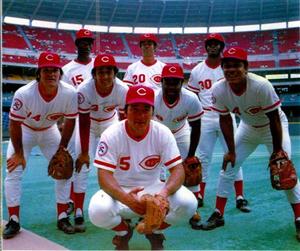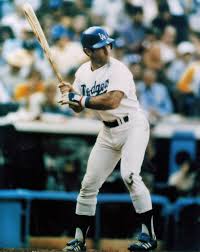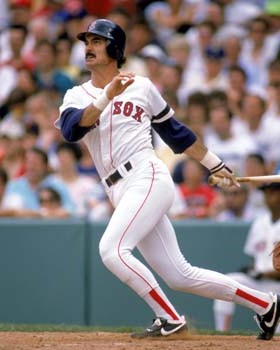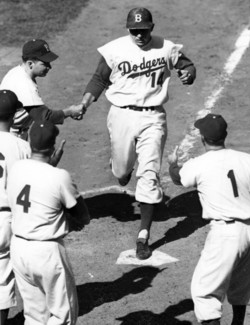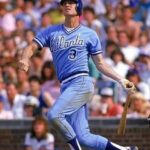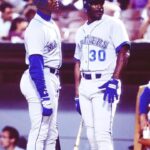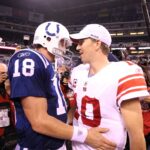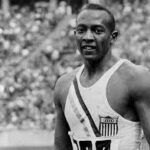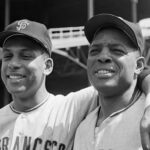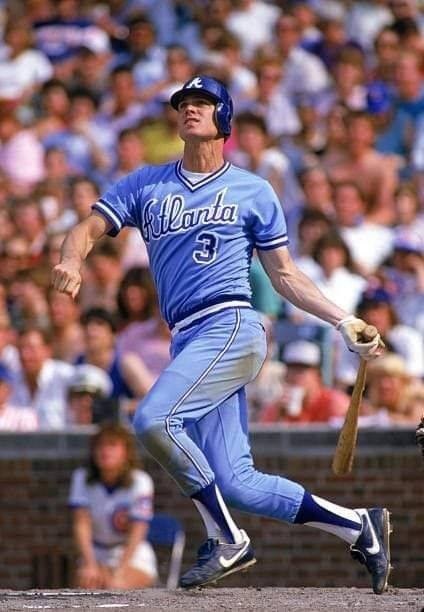Former MLB Stars Who Deserve Their Day in Cooperstown
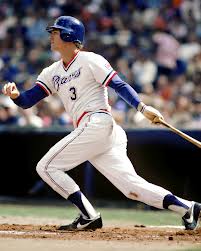
With 398 home runs and two MVP Awards, would Dale Murphy had made the Hall of Fame if it hadn’t been for the Steroid era?
In a year in which baseball’s all-time leader in home runs, a member of the prestigious 3,000 hit club and the winner of 354 games on the mound are all eligible for the Baseball Hall of Fame for the first time, not a single modern-era player will receive baseball’s greatest honor during the annual induction ceremony on Sunday.
To honor this auspicious occasion, Sports Then and Now is recognizing five baseball players that we believe have legitimate claims to being in the Hall of Fame and who very likely might have received the “call to the Hall” years ago had not a generation of players totally changed the perception of offensive production.
Dale Murphy
398 HR, 1,266 RBI, .265 Batting Average, 161 stolen bases, 1,197 runs, 350 doubles
When Dale Murphy retired from baseball in 1993 the PED era in baseball was just getting started. By the time he became eligible for the HOF ballot in 1999, Mark McGwire and Sammy Sosa had made a mockery of the single season home run record and Murphy’s career total of 398 home runs and top season of 44 dingers were no longer particularly impressive.
As a result, Murphy was included on 19.3% of the ballots in his first year and 23.2% the next year, but as the home run totals of current players escalated, his vote totals steadily declined. He was included on only 8.5% of ballots by 2004 and never legitimately had a chance for induction. His run through the HOF gauntlet mercifully ended earlier this year as he received 18.1% of the votes (75% needed for induction) in his final year on the ballot.
During his peak years in the 1980s, it is hard to imagine that Murphy would never even come close to being a Hall of Famer. From 1980-1987 Murphy eclipsed the 30 home run mark six times, including a career-high 44 home runs in 1986.
He won back-to-back National League MVP Awards in 1982 and 1983. In 1983, he led the NL with 121 RBI while joining the prestigious 30-30 club with 36 home runs and 30 stolen bases.
What some critics point to as the reason Murphy is not in the HOF is that while his peak years were impressive, they didn’t last particularly long. He was an All-Star in seven of eight seasons (all but the strike shortened 1981 season) while also winning five golden gloves, but from 1988 through his retirement, he was no longer an elite player.
Murphy was traded by the Atlanta Braves to the Philadelphia Phillies in 1990 and in his final six seasons never had a higher batting average than .252 and never hit more than 24 home runs in a season.
However, Murphy’s peak and career numbers can be favorably compared to several Hall of Famers, including Tony Perez and Jim Rice. In addition, the fact that he had speed and was a gold glove outfielder would seem to warrant a spot in the HOF.
Dave Concepcion
101 HR, 950 RBI, .267 Batting Average, 321 stolen bases, 993 runs, 389 doubles
On a team filled with slugging stars, Dave Concepcion provided the “Big Red Machine” of the Cincinnati Reds with a stalwart defender at the critical shortstop position. In addition, after not being particularly overwhelming offensively early in his career, the slick fielder eventually developed into one of the better hitting shortstops in baseball.
In the 1970s, shortstops were built like string beans, not like football players. Concepcion fit that mold with a long and lanky frame of 6-foot-2 and 155 pounds.
However, it is likely no coincidence that his arrival in the majors in 1970 coincided with the first of four World Series appearances by the Reds during the 1970s. He hit .260 as a rookie and he was basically the regular shortstop for the Reds until future Hall of Famer Barry Larkin joined the team nearly two decades later.
From 1973 through 1982, Concepcion made nine All-Star appearances, won five gold gloves, two Silver Slugger awards and twice finished in the top 10 in the MVP voting.
His 10-year averages of .282 with 150 hits, 65 runs, 26 doubles, 8 home runs, 66 RBI and 22 stolen bases may not be impressive compared to future shortstops like Cal Ripken Jr., Derek Jeter and Alex Rodriguez, but they far exceed the best offensive seasons for Hall of Fame shortstops Ozzie Smith and Luis Aparicio.
Perhaps because he didn’t win as many Gold Gloves as Smith or Aparicio (partly because Smith came in and started taking all the hardware), Concepcion never really was a serious contender for HOF induction. He barely broke the 5% threshold during his first year on the ballot (6.8%), but did manage to stay on the ballot for all 15 years. His highest total was 16.9% in 1998 and then after falling down to barley 10%, he was on 16.2% of the ballots during his final year on the ballot in 2008.
Given his solid offense and excellent defense for the best team of its era, I think Concepcion is one player who definitely deserves another look when it comes to whether he should be in the Hall of Fame.
Steve Garvey
272 HR, 1,308 RBI, .294 Batting Average, 83 stolen bases, 1,143 runs, 440 doubles
Much like Dale Murphy, there was a stretch of years when Steve Garvey was as good as any player in baseball. However, it is likely that his inability to maintain that elite level over his entire career accounts for why Garvey is on the outside of the Hall of Fame.
After gradually working his way into the lineup for the Los Angeles Dodgers, Garvey proved himself by hitting .304 in 114 games during the 1973 campaign.
The following year, Garvey burst onto the national scene by not only earning a starting spot on the All-Star team as a write-in candidate, but was then named the MVP of the game. He was eventually selected as the National League MVP after hitting .312 with 21 home runs and 111 RBI as the Dodgers reached the World Series for the first time in nearly a decade.
Between 1974 and 1980, Garvey averaged 23 home runs, 104 RBI, 201 hits, 88 runs scored and a .311 batting average while reaching 200 hits and a .300 or higher batting average six times. He finished second in the MVP voting in 1978 and sixth in 1976, 1977 and 1980.
The Dodgers reached the World Series three times in the decade, but were never able to actually bring home the World Series title.
That changed in the strike-shortened 1981 season when Garvey didn’t necessarily have as good an offensive season as in the past (10 HR, 64 RBI, .283 average in 110 games), but he did help lead the Dodgers to their first World Series title since 1965.
His streak of 1,207 consecutive baseball games played is the fourth highest in Major League Baseball history. He was selected to the All-Star team 10 times and was a four-time Gold Glove winner.
Garvey signed as a free agent with the San Diego Padres following the 1982 season and though he never again hit .300 or drove home a hundred runs, he did help lead the Padres to the World Series in 1984.
When he retired in 1987, Garvey’s career statistics made him a borderline Hall of Famer in the eyes of many, but by the time he became eligible in 1993 things had started to change. He received 41.2% of the votes in 1993 and 42.6% in 1995, but as the power numbers of current players steadily increased, his vote total steadily declined to the point where he received only 21.1% of the votes in his final year of eligibility in 2007.
Now in hindsight, I think the initial analysis of Garvey as a borderline Hall of Famer still sticks. He had some great years and was one of the iconic players of the 1970s, but perhaps didn’t sustain that greatness long enough to earn a spot in Cooperstown.
Dwight Evans
385 HR, 1,384 RBI, .272 Batting Average, 78 stolen bases, 1,470 runs, 483 doubles
Dwight Evans spent much of his career in the shadow of his better known outfield mates Carl Yastrzemski, Fred Lynn and Jim Rice, but for 18 seasons he was one of the steadiest rightfielders in baseball.
During the early part of his career, Evans was known primarily for his defensive prowess. He made a spectacular play during the 1975 World Series and earned a Gold Glove in 1976, 1978 and 1979.
He started to get recognized for his offensive ability in the strike-shortened 1981 campaign when Evans tied for the league lead with 22 home runs while leading the league with 215 total bases to finish third in the MVP voting.
The following season he eclipsed 30 home runs for the first time and throughout the 1980s was a consistent offensive producer exceeding 30 home runs three times and 100 RBI on four occasions.
After helping the Red Sox back to the World Series in 1986, the following season at age 35 he had career highs with 34 home runs, 123 RBI and a .305 batting average.
Evans reached the 100 RBI plateau again in each of the next two seasons, but after slipping slightly at the age of 38 in 1990, he finished his career with a single season playing for the Baltimore Orioles.
Partly because of his long career, Evans actually finished his career with more home runs than Jim Rice, Orlando Cepeda, Jim Rice and Ralph Kiner. However, even with eight career Gold Gloves and a reputation as one of the best defensive rightfielders in history, Evans received very little support from the Hall of Fame voters.
He was included on 5.9% of the HOF ballots during his initial year of 1997 and exceeded 10% the following season, but he dipped below the 5% threshold (3.6%) in 1999 and was therefore removed from the HOF ballot.
Even with his defensive greatness, I am not sure that Evans is more deserving of being in the HOF than Murphy or Garvey, but he certainly had some excellent individual seasons and has the career numbers that would seem to have warranted more consideration than he received.
Gil Hodges
370 HR, 1,274 RBI, .273 Batting Average, 63 stolen bases, 1,105 runs, 295 doubles
I think there are quite a number of people, including perhaps even Hall of Fame voters, who just assume that Gil Hodges is a Hall of Famer. However, for some amazingly crazy reason, Hodges is perhaps the most deserving omission in Hall of Fame history.
After making his major league debut for the Brooklyn Dodgers as a 19-year-old in 1943, World War II was a major reason that Hodges didn’t return to the majors until late in the 1947 season.
But starting in 1948, he spent the next 12 seasons as the steady first baseman that helped make the Dodgers a regular contender. On a squad that also included Hall of Famers Duke Snider, Jackie Robinson, Pee Wee Reese and Roy Campanella, Hodges was another iconic member of the “Boys of Summer.”
From 1949 through 1957 Hodges averaged 32 home runs, 108 RBI, 95 runs and a .284 batting average as the Dodgers reached the World Series five times, winning in 1955.
One negative for Hodges may be his 0-for-October performance during the 1952 World Series as he went o-for-21 in a seven game loss to the Yankees. However, he rebounded the following season to hit .364 and in their winning World Series of 1955, Hodges hit .292 with a home run and five RBI. The following season he had eight RBIs in another seven game loss to the Yankees.
After the Dodgers moved to Los Angeles in 1958, Hodges continued to be an anchor at first base and in 1959 hit .276 with 25 home runs and 80 RBI as the Dodgers advanced to another World Series.
In what would be his final Fall Classic as a player, Hodges hit .391 with a home run and two RBI as the Dodgers defeated the Chicago White Sox in six games. For his career, Hodges played in 39 career World Series games and hit .267 with five home runs and 21 RBI.
He finished his playing career as a member of the first two versions of the New York Mets and thus was part of one of the worst teams in baseball history.
However, he left the Mets during the 1963 season to take over as manager of the Washington Senators. Though he never had a winning season in five campaigns, the Senators did improve in each campaign.
He rejoined the Mets in 1968 as their manager and in just his second season led the team to a 100 victory season and their famous miracle World Series victory over the Baltimore Orioles.
The Mets had identical 83-79 records over the next two seasons and Hodges died at the age of 47 just prior to the start of the 1972 season.
Given his valuable role on one of the most successful teams of the 1950s, I think there is a very legitimate argument for Hodges to be in the Hall of Fame simply for playing career. However, when you add the fact that he was the winning manager for one of the greatest World Series upsets of all time, I just can’t understand how Hodges didn’t get into the HOF very early in his eligibility.
During his 15 year HOF voting odyssey, Hodges earned 24.2% in his first year, but it quickly escalated to around 50% and he received percentages from the high 40s to the low 60s every year. In his final year on the ballot in 1983, Hodges received 63.4% of the votes. In subsequent years, he has come very close to being selected by the various renditions of the Veteran’s Committee, but for some reason has never been able to earn induction in that manner either.
While you wouldn’t believe it should have been a factor, you wonder if his early death may have played a role in keeping Hodges out of the Hall of Fame. Had he continued as a manager for an extended period, he would have remained in the minds of the voting media, but following his death he was no longer top of mind as other players came along to snare the required votes.
I hope that one day Hodges will join his Dodgers teammates in Cooperstown, but at this point you could say that maybe it doesn’t matter if Hodges ever is inducted into the Hall of Fame. He is still a legendary figure to fans of the Brooklyn Dodgers and is references alongside other legends in the movie Field of Dreams.
